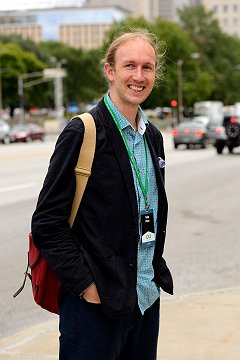Computer science provides an in-depth understanding of technical aspects of programming concepts, but if we want to understand how programming concepts evolve, how programmers think and talk about them and how they are used in practice, we need to consider a broader perspective that includes historical, philosophical and cognitive aspects.
In this paper, we develop such broader understanding of monads, a programming concept that has an infamous formal definition, syntactic support in several programming languages and a reputation for being elegant and powerful, but also intimidating and difficult to grasp.
This paper is not a monad tutorial. It will not tell you what a monad is. Instead, it helps you understand how computer scientists and programmers talk about monads and why they do so. To answer these questions, we review the history of monads in the context of programming and study the development through the perspectives of philosophy of science, philosophy of mathematics and cognitive sciences.
More generally, we present a framework for understanding programming concepts that considers them at three levels: formal, metaphorical and implementation.
We base such observations on established results about the scientific method and mathematical entities — cognitive sciences suggest that the metaphors used when thinking about monads are more important than widely accepted, while philosophy of science explains how the research paradigm from which monads originate influences and restricts their use.
Finally, we provide evidence for why a broader philosophical, sociological look at programming concepts should be of interest for programmers. It lets us understand programming concepts better and, fundamentally, choose more appropriate abstractions as illustrated in a number of case studies that conclude the paper.
Tomas is a Visiting Researcher at the Alan Turing institute, working on tools for open data-driven storytelling. He is building tools that integrate with modern data sources (open government data, data published by citizen initiatives) and let users easily create analyses and visualizations that are linked to the original data source, making the analyses more transparent, reproducible, but also easy to adapt. His early work on the project can be found at http://thegamma.net.
Tomas’ many other interests include open-source and functional programming (he is an active contributor to the F# ecosystem), programming language theory (his PhD thesis on “coeffects” develops a theory of context-aware programming language language), but also understanding programming through the perspective of philosophy of science.
Thu 12 AprDisplayed time zone: Amsterdam, Berlin, Bern, Rome, Stockholm, Vienna change
13:45 - 15:00 | |||
13:45 45mTalk | What we talk about when we talk about monads Research Papers Tomas Petricek Alan Turing Institute Link to publication DOI | ||
14:30 30mTalk | Deadlock-Free Typestate-Oriented Programming Research Papers Luca Padovani University of Turin, Italy Link to publication DOI | ||
